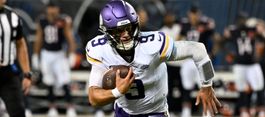This is Part II of a three-part series on how cognitive biases and faulty assumptions lead us astray in draft environments. Check out Part I, on recency bias.
Dominate with our award-winning fantasy football draft software ![]()
Part II: Herd Behavior
I want to tell you a story about a man named Nick Corrigan.
Nick lives in Wales. And, according to a profile that ran on WNYC’s Radiolab, Nick has been on 44 game shows. He has won 43 of them.
Now, Nick isn’t a trained psychologist or data scientist. He isn’t a full-time gambler.
No, Nick just loves game shows. He always has – at least, for as long as he can remember. And from this love grew an obsession: to figure out how to beat them.
And of all the games Nick has conquered, he is perhaps most famous for his appearance on a British game show named Golden Balls. Because, during his appearance on the show, Nick broke one of game theory’s most popular psychological dilemmas. One that is studied by researchers and economists; one that deals in heady matters of decision-making, cooperation, memory, and betrayal.
Nick conquered the Prisoner’s Dilemma.
What is The Prisoner’s Dilemma?
You may not have known it, but you’ve probably come across the Prisoner’s Dilemma before. The original scenario, first developed by researchers at RAND Cooperation in the 1950s, goes like this:
Two prisoners are charged with a crime and split into separate rooms, where each is given the opportunity to confess. Neither prisoner knows what the other will do. From this, several different outcomes might emerge. If only one prisoner confesses, the confessor is set free, but the non-confessor serves a three-year sentence. If both confess, they each serve a two-year sentence. And if neither prisoner confesses, they each serve a one-year sentence.
Derivatives of this moral decision-making conundrum have permeated countless industries, including game shows, where it’s often repurposed into the following format: two contestants have the chance to win $100,000. Each contestant must choose how he or she wants to split the money, without knowing what the other contestant will choose. If they both choose “split,” they each win $50,000. But, if they both choose “steal,” neither contestant walks away with any prize money. Now, here’s where it gets interesting: if one player chooses “split,” but the other chooses “steal,” the stealer takes home the full $100,000.
Just as in the original thought experiment with the prisoners, it would mutually benefit both game show participants if they chose to work together (in other words, if they both chose “split”). But of course, there’s an element of trust that is required to select that option, because if the other contestant reneges on his or her word, and chooses “steal,” the stealer wins it all. The “splitter” is left holding the bag, proverbially speaking.
And what makes Golden Balls particularly riveting (well, for those that enjoy studying human behavior, anyway), is that this game show gives contestants the opportunity to speak with each other before making their individual choices. So, as a television viewer, you get to watch these tense negotiations unfold before your eyes: should Contestant A trust Contestant B? Is one of them lying? Will one (or both) end up choosing “steal”? You can get lost in YouTube clips where one contestant thoroughly convinces the other he or she will choose “split,” only to pull the rug out from under them when their selections are ultimately revealed.
Here’s How Nick Broke The Game
So, Nick makes it onto Golden Balls, where he and another contestant are faced with the Prisoner’s Dilemma. But, Nick does something that – quite literally – had never been done before in the show’s history. It was a strategy that flew in the face of conventional wisdom; one that was met with scorn, defensiveness, and ridicule – both from the other contestant and the studio audience.
You see, once the negotiations begin, Nick flat out tells the other contestant he was going to choose “steal.”
He says to the other guy, “I want you to trust me. 100 percent. I’m going to pick ‘steal.’ And I want you to choose ‘split,’ and I promise you that I will split the money with you [later].”
The other contestant begs Nick to reconsider – he, of course, wants them to both choose “split.” So first, he tries to convince Nick that he is a man of integrity. He says to Nick, “my father once said to me, ‘a man who doesn’t keep his word is not a man. He’s not worth nothing.'” But Nick doesn’t budge. He replies to the other contestant, “That’s nice. I’m still going to choose ‘steal.'”
This goes on for 45 minutes. Eventually, the other contestant gets defensive. He threatens to pick “steal” as well, out of spite, so they both end up with nothing. But Nick just shrugs the threat off. He refuses to negotiate. “I’m going to pick ‘steal,'” Nick reiterates, “and [after the show] I will split the money with you.”
The audience begins to turn on Nick. They boo him. But Nick stays on course – he never wavers. Finally, the two contestants are forced to privately lock in their choices.
The other contestant reluctantly chooses “split.”
And Nick? His answer is revealed. The audience gasps.
“Split.”
The Lesson of the Prisoner’s Dilemma
The Prisoner’s Dilemma has been analyzed and dissected by some of the best minds in psychology, behavioral economics, and game theory for decades. And yet, this game show enthusiast from Wales was able to uncover an insight that both scholars and industry leaders had largely missed. You see, when it comes down to it, people often do not make rational choices. But, it’s not because they are greedy, or dishonest, or inherently evil. It’s actually much simpler than that.
People don’t want to look bad.
Nick’s revelation was that people don’t pick “steal” in the game because they’re selfish. They pick “steal” because they don’t want to look like a fool. They’re afraid to be duped by the other contestant, and they’re willing to sacrifice $50,000 just so they don’t look like a sucker on national television. This was the brilliance of Nick’s strategy: he took that fear of looking bad away from the other contestant. He forced his hand, and he made it so that contestant had only one choice: “split.” Nick wanted a split from the beginning – he just knew that the path to splitting wasn’t the path that conventional wisdom suggests.
In fact, remember how the other contestant implored Nick to reconsider his choice? Remember the line that contestant shared, that he wouldn’t renege on his word because his father taught him the value of honesty and integrity? The other contestant later admitted it was lie: in fact, he had never even met his father.
You see, Nick Corrigan understood two truths of the human condition. One: everybody lies. And two: nobody wants to look bad.
Herd Behavior, Optics, and Fantasy Football Draft Day
We don’t like to admit it, but the research is emphatic: we often make decisions based less on what they will achieve, and more on how they will look. This concept, known as herd behavior, might affect everything from what restaurant we choose to dine in to what clothes we decide to buy. It helps explain why competing movie studios often put out similar films at the same time. It might even explain why so many pollsters didn’t accurately predict the results of the 2016 U.S. presidential election.
We see ourselves as individuals, as contrarian thinkers capable of going against the grain; but, when it comes down to it, we often don’t realize how much “the group” influences how we think, behave, and act.
Fantasy football drafts are exercises in herd behavior. Mock draft platforms reward us for choosing players in a certain, conventional order. On draft day, we power up our fantasy modules, which include built-in player rankings, overtly framing which players are “supposed” to be drafted, and when. We make our selections in a room full of family, friends, or peers: people who will jeer at unorthodox draft choices. Just as on Wall Street, “runs” at a certain position, be it quarterback or tight end, often influence us to select a player before we planned to (or didn’t plan to, at all). And, whether we like to admit it, the underlying reason we make many of these decisions isn’t data or strategy – those are merely convenient facts we find later.
No, it’s much simpler than that: we care about optics. We care about what people think of us. We don’t want to miss out – and we don’t want to look bad.
Remember, It’s (Always) Better to be Early
Look, I’m not saying we should throw out all player rankings or expert analyses. Nor am I suggesting that you should take some long-shot handcuff in the second round. If I can leave you with one takeaway, it’s this: on draft day, it’s better to be a round too early than a round too late.
If you love a player in 2020 – if you believe that he is a potential league-winner – don’t get cute. Don’t succumb to the pressure of your draft room, and wait to select him at his ADP. Go and get the guy you believe in, even if you’re a round (or two) early. Because you never know who else in your draft room loves that player, too. If you think Derrick Henry will finish the season as the RB1, well then pick him – regardless of your first round positioning. Don’t get saddled with a player you don’t believe in as much merely because of some arbitrary factor like which position you’re drafting from. Because once the ball is kicked off, those pre-draft rankings are absolutely meaningless.
Nick Corrigan taught us that we all hate to look bad. We don’t want to look like fools – and we’re even willing to lie to each other in order to save face.
Don’t forget his lesson on draft day. Remember the Prisoner’s Dilemma; remember that most of your league mates will tell you they’ll choose “split.”
Don’t be afraid to think differently. Don’t worry about looking bad.
After all, at least in fantasy football, draft days are for the stealers.
Ready for your draft? Try a FAST mock and get an instant grade ![]()
Subscribe: Apple Podcasts | Spotify | Google Podcasts | Stitcher | SoundCloud | iHeartRadio
Beyond our fantasy football content, be sure to check out our award-winning slate of Fantasy Football Tools as you prepare for your draft this season. From our free mock Draft Simulator – which allows you to mock draft against realistic opponents – to our Draft Assistant – that optimizes your picks with expert advice – we’ve got you covered this fantasy football draft season.








